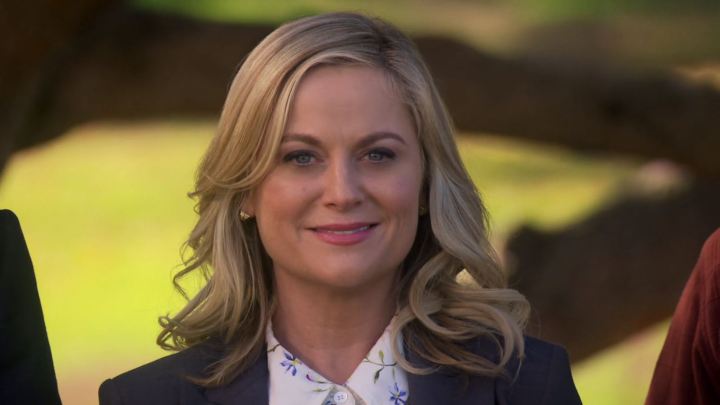These posts are about great acting performances sustained across the full run of a television series.

Amy Poehler as Leslie Knope in Parks and Recreation (2009 – 2015)
Sometimes I feel like Parks and Recreation was single-handedly saved by the intense dedication of its lead character. In positing this, I don’t mean Leslie Knope, played by Amy Poehler, somehow toiled away, overstuffed binders at the ready, to whip the series into shape, in some meta creative magic. Instead, I think there was something very special in the character that carried the program away from what seemed to be its original intention, replicating the withered cynicism of The Office in a civic government workplace. For much of the show’s short first season, the depiction of Knope was problematically close to Steve Carell’s take on Dunder Mifflin manager Michael Scott. Leslie’s enthusiasm for excelling in her low stakes job was simply another version of Michael’s intense neediness, positioned in the narrative as fodder for mockery.
As was the case within the fictional municipal office, where Leslie’s earnest devotion to improving her community gradually won over her coworkers, so too did the creative team behind Parks and Recreation come to realize — more quickly, praise be — that the central Type A tsunami of accomplishment with the smart pantsuits was a figure worthy of admiration. The wry assessment of haplessness and snickering piercing of uncompromising certainty that served Parks and Recreation creators Michael Schur and Greg Daniels well on The Office was out of place in Pawnee, Indiana, at least when it was directed at the main characters (other, more obscure denizens of the town were fair game for this brand of comedy, especially if those characters didn’t properly recognize the charms of Leslie and her crew). Without jettisoning the need for conflict to drive story and perks of judgment in bolstering comedy, Parks and Recreation prospered when it shifted from the bleating lament of perpetual defeat to resounding pride for jobs well done.
Poehler, it seems, understand that from the jump. She’s written about the immediate connection she felt with Leslie. Out in the real world, Poehler is known for sharp opinions and an emotionally generous brand of pragmatic kindness. Self-assurance is a virtue, even if — perhaps pointedly because — it is not always easy to come by. Social forces are continually pushing back against those who assert themselves, with women often getting the worst of it. But the personal progress that is earned shouldn’t be denied just because opponents of change are yelling louder through faces scrunched like fists. In Parks and Recreation, Leslie faces down more than her fair share of those moral miscreants. Poehler shows the fire that sustains the character and the grace that usually wins the day, even if the day appears to be officially tallied as a setback.
Leslie isn’t portrayed as some paragon of virtue. She can be impatient, obstinate, and inconsiderate in her rush to keep scratching checkmarks onto her to-do list. All those impulses are given there due by Poehler, with the confidence that the more nettlesome qualities of the character make her more complete, and therefore bring added heft to her triumphs. They, too, are part of the ongoing effort to improve herself, her department, her community.
When Leslie finally fulfills a longed for goal, casting a vote for herself in a hotly contested local election, the wash of emotion that comes over her is beautifully truthful, a proper culmination of character’s experiences to that point. Poehler plays it to perfection, conveying the collapsing relief at crossing a certain finish line, as well as how even hope can carry a heavy weight. The moment might work fine on its own, but its hammer blow effect is because of the long, artful journey Poehler has taken with the character, the life she’s injected to the role.
In the early episodes of Parks and Recreation, the validity of Leslie’s perspective sometimes got obscured by the natural instinct — very much in keeping with the prevailing comedic voices of the time — to layer on the snark. Poehler helped shift those winds. Her emphatic, empathetic performance gave the series something truly special: a open-hearted embrace of the sheer value in belief.

Previously….
Keri Russell in The Americans
Discover more from Coffee for Two
Subscribe to get the latest posts to your email.